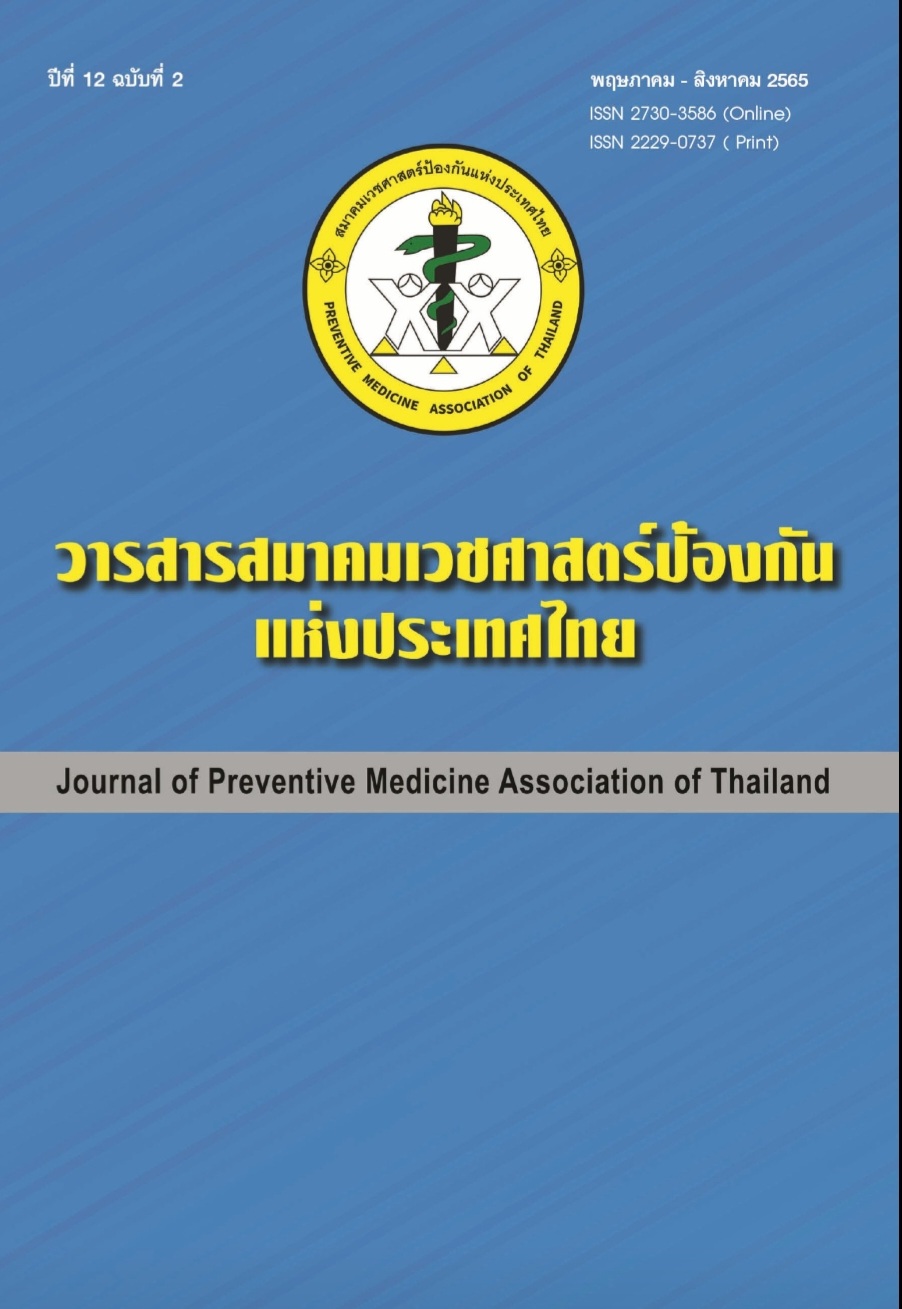The effectiveness of self-management program on medication compliance for asthma controlled in asthma patients at Uthai Hospital, Phra Nakorn Si Ayutthaya Province
Keywords:
Asthma, Self-management, medication complianceAbstract
This Quasi experimental research used pretest-posttest control group design and two groups comparison proposed to study the proper self-management program for adult asthma patients (age 25 and older). The experimental group consisted of 27 asthma patients and the control group consisted of 24 asthma patients. Each patient received both oral medication and metered-dosed inhaler. The experimental group received self-management program for 3 months consisted of medical evaluation, problem finding, determining the target, learning in self-management, recording the drug-related problems, role playing and follow up phone calls after the program. The study revealed that the self-management program could reach the asthmatic controlled achievement (p-value <0.001) and improve the patient’s compliance of using the metered-dosed inhaler (p-value <0.001). The self-management program on the medication compliance model can enhance better treatment outcomes in asthma patients.
References
World Health Organization. Global status report on noncommunicable diseases 2010. Geneva: World Health Organization; 2011.
Boonsawat W, Charoenphan P, Kiatboonsri S, Wongtim S, Viriyachaiyo V, Pothirat C, et al. Survey of asthma control in Thailand. Respirology 2004; 9(3):373-8.
สมาคมสภาองค์กรโรคหืดแห่งประเทศไทย. แนวทางการวินิจฉัยและรักษาโรคหืดในประเทศไทย สำหรับผู้ใหญ่ พ.ศ. 2562. [อินเทอร์เน็ต] 2562. [เข้าถึงเมื่อ 20 มิ.ย.2564]. เข้าถึงได้จาก: https://www.tac.or.th/download/
Reddel HK, fitzGerald JM, Bateman ED, Bacharier LB, Becker A, Brusselle G, et al. GINA 2019: a fundamental change in asthma management. Eur Respir J 2019 53:1901046. DOI: 10.1183/13993003.01046-2019.
Kanfer FH. Helping people change. 2nd ed. New York: Pergamon; 1980.
Tobin DL, Reynolds RVC, Holroyd KA, Creer TL. Self-management and social learning theory. In Holroyd KA, Creer TL, editors. Self-management of chronic disease: handbook of clinical intervention and research. London: Academic Press; 1986. p.29-55.
Lorig KR, Holman H. Self-management education: history, definition, outcomes, and mechanisms. Ann Behav Med 2003;26(1):1-7.
Edworthy SM. How important is patient self-management? Baillieres Best Pract Res Clin Rheumatol 2000;14(4):705-14.
Hill-Briggs F, Gary TL, Yeh HC, Batts-Turner M, Powe NR, Daudek CD, et al. Association of social problem solving with glycemic control in a sample of urban African Americans with type 2 diabetes. J Behav Med 2006;29(1):69-78.
Mensing C, Boucher J, Cypress M, Weinger K, Mulcahy K, Barta P, et al. National standards for diabetes self-management education. Diabetes Care 2005;28(Suppl 1):S72-9.
National Asthma Education and Prevention Program. Expert panel report : guidelines for the diagnosis and management of asthma. [Internet] 2002. [cited 2021 Jun 20]. Available from: https://www.nhlbi.nih.gov/files/docs/guidelines/asthmafullrpt_archive.pdf
อรนุช เรืองขจร, วราลักษณ์ กิตติวัฒน์ไพศาล. ประสิทธิผลโปรแกรมการจัดการตนเองของผู้ป่วยโรคหืดต่อพฤติกรรมการจัดการตนเองและระดับการควบคุมโรคของผู้ป่วยโรคหืด โรงพยาบาลระโนด จังหวัดสงขลา. วารสารพยาบาลศาสตร์และสุขภาพ 2554;34(3):11-21.
สินีนาฏ เนาว์สุวรรณ, กิตติพร เนาว์สุวรรณ. พฤติกรรมส่งเสริมสุขภาพของผู้ป่วยโรคหืด. วารสารการพยาบาล การสาธารณสุขและการศึกษา 2560;18(1):29-38.
สุณี เลิศสินอุดม, เกศริน ชูปัญญาเลิศ. ผลลัพธ์ทางคลินิกและคุณภาพชีวิตของผู้ป่วยโรคหืด คลินิกโรคหืด โรงพยาบาลระดับตติยภูมิ. วารสารเภสัชศาสตร์อีสาน 2559;11(ฉบับพิเศษ):234-44.
แสงเดือน หาญครุฑ. ผลของโปรแกรมการส่งเสริมความสามารถในการปฏิบัติตนต่อระดับการควบคุมโรคของผู้ป่วยหอบหืด. วารสารการพยาบาลและสุขภาพ 2553;4(2):72-81.
วิยดา สุวรรณชาติ, นรลักขณ์ เอื้อกิจ. ผลของโปรแกรมส่งเสริมการรับรู้สมรรถนะแห่งตนต่อพฤติกรรมการจัดการตนเองของผู้ป่วยโรคหืดวัยผู้ใหญ่. วารสารเกื้อการุณย์ 2559;23(1):60-72.
Downloads
Published
How to Cite
Issue
Section
License
Copyright (c) 2022 Journal of Preventive Medicine Association of Thailand

This work is licensed under a Creative Commons Attribution-NonCommercial-NoDerivatives 4.0 International License.
บทความที่ลงพิมพ์ในวารสารเวชศาสตร์ป้องกันแห่งประเทศไทย ถือเป็นผลงานวิชาการ งานวิจัย วิเคราะห์ วิจารณ์ เป็นความเห็นส่วนตัวของผู้นิพนธ์ กองบรรณาธิการไม่จำเป็นต้องเห็นด้วยเสมอไปและผู้นิพนธ์จะต้องรับผิดชอบต่อบทความของตนเอง






